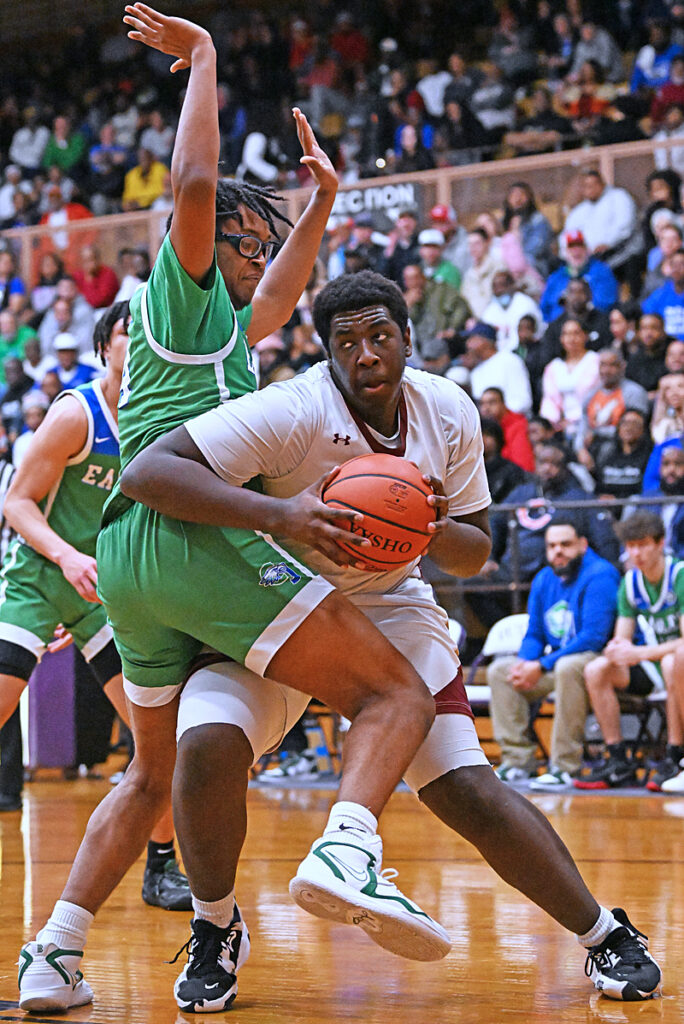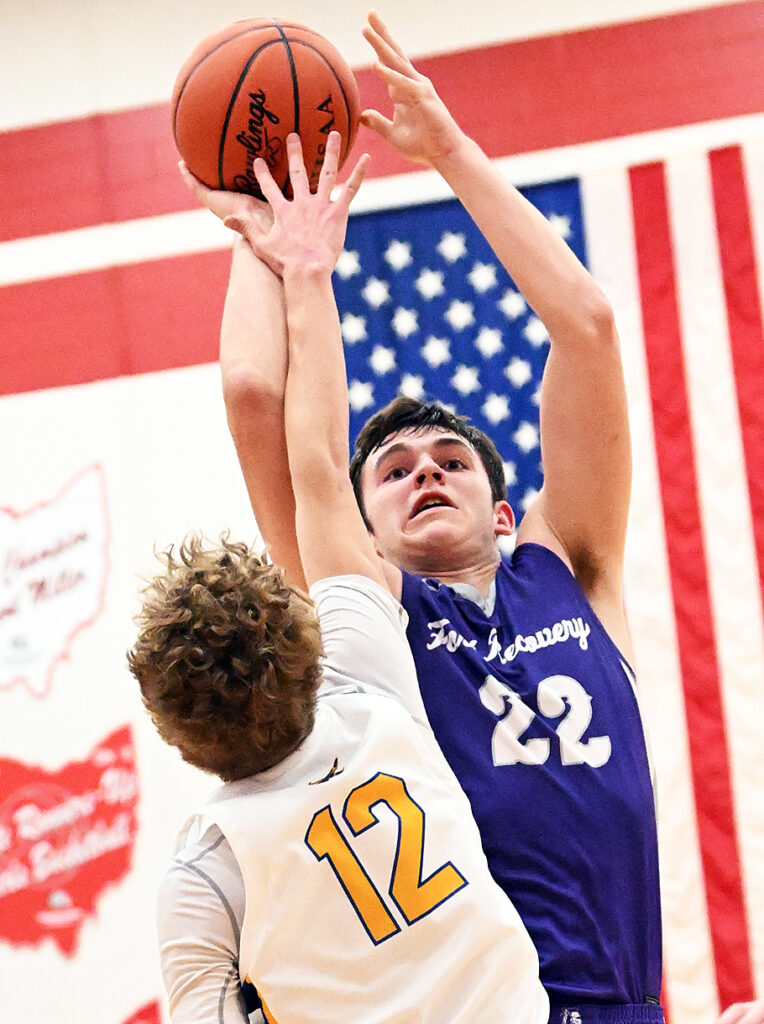
Based on what we thought we used to know about basketball, this is a foul. Today…not so much! (Press Pros File Photos)
Because we live in an emotional world that we can’t control, what you don’t know about officiating and tournament basketball would do you a lot of good…once someone explained it to you.
 It is the season. Tournament basketball and the emotions dictated by seasons on the line, kids at risk with heightened physical play, and the lack of a call by the officials viewed by a thousand spectators who see contact…and, no foul!
It is the season. Tournament basketball and the emotions dictated by seasons on the line, kids at risk with heightened physical play, and the lack of a call by the officials viewed by a thousand spectators who see contact…and, no foul!
“&^$#& it, that has to be a foul,” someone screamed from the stands during last weekend’s girls regional play at Butler High School. “You think she &%#$#$^&* fell down on her own?”
In this case, a parent, perhaps, saw their school’s season came to an end that day, but not because of a call, or the lack of one. Rather, it was just basketball. Officiating had nothing to do with it.
In another game earlier in the week, PPM columnist Bruce Hooley remarked in his game story that the lack of a call was ‘abysmal’, which was brought to my attention days later by veteran official, and supervisor, Kevin Forror.
“That was out of line,” said Forror. “We got that call right, and officials are losing respect for Press Pros because of what you wrote.” Words to that effect. I didn’t record him. It wasn’t an interview, just a conversation.
But I appreciate his mentioning this to me because I appreciate Kevin, his career as an official, and when he says, “Southwest Ohio officials work very hard to be consistent and dependable when we’re out there” I believe him. And generally, because of my own years in officiating, both in high school basketball and eight years in minor league baseball. I believe that officials believe they’re right when they make a call.
But based on the state of the game, there needs to be a few things said to set the record straight…about why people lose their minds in the stands…and more importantly, about kids probably being the last to know that modern officiating is not cut and dry – not anymore. Not when it comes to contact.
First, let me say that officials are like everyone else in modern culture, relative to sensitivity. And I say it…we’re all easily offended!
It’s different from my days behind home plate when no less than National Leaguer Doug Harvey, hall of fame umpire and the best of all time, shared his thoughts on officiating and thin skin, even back then.
“Don’t ever believe someone when they tell you they like your umpiring.” he said, soberly. “Not even a supervisor. You don’t do this job for compliments.”
This came after I was actually the subject of the 11 o’clock news once in Chattanooga, Tennessee, over a call I made in a minor league baseball game. There were seven ejections, and before we resumed play the entire Chattanooga bench was confined to the clubhouse until the game’s conclusion. I think we might have gotten the organist, too, for too much “Three Blind Mice.”
 They ran that video for weeks in Chattanooga as a promo for the late night sports on Channel 11. No one was traumatized.
They ran that video for weeks in Chattanooga as a promo for the late night sports on Channel 11. No one was traumatized.
Second, officiating has changed over the years as athletes have gotten bigger, faster, stronger, and more athletic. And coaches want the game to reflect the athleticism of the modern athlete. They’re willing to put up with more contact than we allowed in the Columbus City League when I worked in the 70s.
Now, fouls are not called on the basis of contact, but on the basis of what the officials determine as disadvantage caused by the contact, a decision that has to be made in the blink of an eye, and of course is highly subjective…an official’s judgment, or opinion. In the old days when there was contact you just called the foul, and it cleaned things up…quickly. Coaches didn’t want their players fouling out and reined them in. That was cut and dry.
It’s different now, and I get that, as long as every official, state-wide, has the same software to determine advantage, and disadvantage. This is what officials, like Forror, mean when they talk about working hard to be consistent and dependable. And I know they do. But what you see from northwest Ohio is different from southwest Ohio – northeast and southeast.

The issue is not someone writing about it…but rather, everyone can see it for themselves now on social media. (Press Pros Feature Photos)
The problem is…the people in the stands don’t understand what they’re seeing, because, we changed the standards over the years without letting them know. They just know someone got kneed in the gut and there was no call. And in truth, the OHSAA and the various officials’ associations around the state would do well to add something to the state tournament program to explain to people, that:
1) Less contact is going to be called because of a more athletic style of play…so expect it.
2) That officials are told not call as many fouls to avoid stoppage of play as much as possible.
3) That coaches and players actually want it this way.
As for media writing about it, you seldom see it anymore because if you question officials it’s viewed as being disrespectful to authority, and we all acknowledge that we don’t want that, either. We’re trying to teach respect for the game, you know.
Except, there’s five thousand people sitting there watching it first-hand, and if a call does influence the outcome of a game, like the no-call on a shot at the buzzer in a district final last year, and you don’t report it…then as a journalist you have no credibility. And that’s just as important to those who write and broadcast as it is to the officials.

Editor and publisher Sonny Fulks writes OHSAA and Big Ten sports for Press Pros.
As to Forror’s contention that Southwest officials take their work as a matter of pride, I’m on board 100% because I’ve known those officials for years, really good ones – Eric Brown, Todd Trainer, Kyle Bachman, Dave Wortman, Chris Stokes, Chuck Docken, Kevin Beckstedt, and yes, Kevin Forror…along with many others. They’ve all missed calls, and they weren’t deterred by it. But you don’t assess officials by a missed call, anyway. You assess them for the manner in which they manage the game, and manage people!
And I’m on record for saying…I believe many high school refs are, yes, more conscientious than what I see in the Big Ten Conference, and the reason is that high school is more local, personal, and they’re not so insulated.
But for the sake of respect, when the people watching are in the dark you can’t take it for granted. This is a day of cell phones, video, and I’ve now seen the play that Hooley wrote about at least a dozen times. And yes, it kinda’ looked like a foul.
So, again I say…spend some time to let people know that the game they think they know is not the same game they remember. There’s just some calls that aren’t going to be made. Doesn’t mean you like it, but it is what it is.
And now you know…at least that much!


